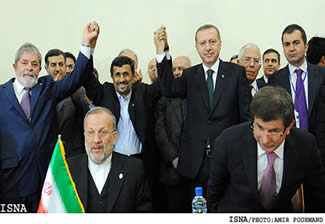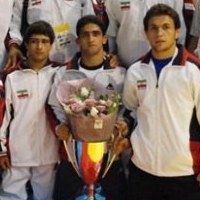Published: may 23, 2010; Intelligence and Terrorism Information Center.

Lula (left), Ahmadinejad (center left) and Erdogan (center right) celebrating the nuclear agreement.
The agreement signed last week between Iranian President Mahmoud Ahmadinejad, Turkish PM Recep Tayyip Erdogan, and Brazilian President Luiz Inácio Lula da Silva, under which Iran is to transfer 1200 kg of low-enriched uranium in exchange for nuclear fuel for the Tehran research reactor, has provoked diverse and contrasting reactions among Iran’s political establishment and media.
The daily Keyhan touted the agreement achieved between the three leaders as a “victory” for Iran. An editorial written by editor-in-chief Hossein Shariatmadari says that Tehran’s statement reflects an Iranian achievement, since it guarantees that if the West fails to meet its obligation to provide nuclear fuel to Iran, the latter will receive back the enriched uranium kept as “collateral” in Turkey. Furthermore, Iran’s willingness to uphold the agreement is contingent on its acceptance by the Vienna Group, representing Western countries. Even if the West does accept the agreement, which Shariatmadari finds unlikely, it will be an acknowledgement by the West of Iran’s right to use peaceful nuclear technology and to enrich uranium. Shariatmadari claimed that Iran did not back down from its position by signing the agreement, and that the uneasy reactions to Tehran’s statement in the US and in Israel reflected the Iranian achievement. Iran wins the battle whether or not the Vienna Group accepts the agreement: if it does, it will thus renounce the claims it formerly brought up against Iran; if it does not, it will be proof that the nuclear program is just a pretext for the West to act against Iran (Keyhan, May 18).
The conservative daily Resalat also expressed support of the agreements reached between Iran on one hand and Turkey and Brazil on the other. An editorial published by the daily says that the agreement leaves the West no excuse to continue acting against Iran. It reflects Iran’s transparency with regard to its nuclear program and its good intentions, allowing it to take back the initiative on the nuclear issue and demand a similar transparency by the West (Resalat, May 18).
Mardom Salari, a daily affiliated with the moderate reformist camp, expressed somewhat mixed support of the agreement. The daily welcomed Iran’s accelerated diplomatic activity with regard to the nuclear issue in recent weeks, expressing hope that the agreement would make it possible to lift some of the sanctions against the country. The daily wondered, however, why Iran had not engaged in such diplomatic activities before the Security Council passed three resolutions against it. An editorial published by the daily one day after the agreement was signed further states that it remains to be seen to what extent it reflects Iran’s full right to continue uranium enrichment (Mardom Salari, May 18).
On the other hand, Ahmad Tavakoli, the chairman of the Majles Research Center, strongly criticized the agreement, saying that it does not guarantee Iran’s national interests. In an interview to Fars, a conservative news agency, Tavakoli (considered one of President Ahmadinejad’s opponents in the conservative camp) said that Iran’s promise to transfer its enriched uranium to Turkey was not conditioned upon obtaining guarantees from the West to provide it with nuclear fuel in exchange. He noted that Iran does not need to agree to the West’s proposal at any cost just to lead the negotiations with it out of the dead end. Tavakoli expressed his concern that the West would not fulfill its part of the bargain and continue to demand that Iran suspend uranium enrichment, and that Turkey might refuse to give back the enriched uranium to Iran under pressure from the West. Tavakoli also warned against the strengthening of Turkey’s regional status at the expense of Iran’s following the agreement. Regarding the Majles’ position on the agreement, Tavakoli said that the Majles does not object to the Western proposal, but only under certain conditions: transferring the uranium only after the West provides Iran with some of the nuclear fuel, swapping the enriched uranium for nuclear fuel in several stages and not all at once, and suspending the sanctions imposed on Iran. He noted that the president must present the agreement to the Majles and explain why he chose to agree to the West’s proposal. According to Tavakoli, the agreement shows that, like former president Khatami, Ahmadinejad is not immune to pressure (Fars, May 17).
Criticism was also voiced by the conservative daily Jomhuri-ye Eslami, affiliated with the chairman of the Expediency Discernment Council, Ali-Akbar Hashemi Rafsanjani. An editorial titled “Victory or Retreat” states that the agreement is a withdrawal from the conditions set by the Supreme Leader for accepting the Western proposal: uranium enrichment on Iranian soil, simultaneous exchange of enriched uranium for nuclear fuel, and letting Iran decide on the quantities of enriched uranium and nuclear fuel exchange under the agreement according to its needs. What is more, the proposal accepted by Iran is worse than previous proposals it had rejected, since under the new proposal Iran is required to transfer 80 percent of its enriched uranium in exchange for 120 kg of nuclear fuel, when under previous proposals it was only required to transfer 75 percent of its uranium in exchange for 200 kg of nuclear fuel. It is not clear, the article says, why Iran needs the agreement given its ability to enrich uranium to 20 percent according to its needs. The agreement is therefore a withdrawal rather than a victory, and Iran must not accept it (Jomhuri-ye Eslami, May 18).



 RSS
RSS










Diverse and Contrasting Reactions about Iran’s Nuclear Agreement #iran http://j.mp/bQfixs
RT @CrethiPlethi: Diverse and Contrasting Reactions about Iran’s Nuclear Agreement #iran http://j.mp/bQfixs
[…] This post was mentioned on Twitter by Elisabeth, Crethi Plethi. Crethi Plethi said: Diverse and Contrasting Reactions about Iran’s Nuclear Agreement #iran http://j.mp/bQfixs […]